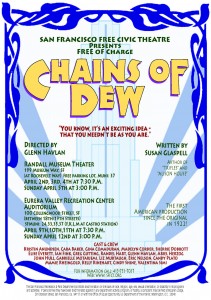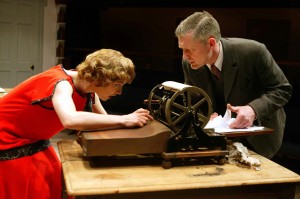July 28 – August 1. Off-Off Broadway Zephyer Rep presented Chains of Dew at
the Wings Theatre, 154 Christopher St., NYC. Directed by Gretchen Ferris.
Category Archives: Chains of Dew
Chains of Dew at the San Francisco Free Civic Theater 2009
 The San Francisco Free Civic Theatre performed the first professional American revival of Chains of Dew since 1922, on April 2-12 2009, directed by Glenn Havlan. The cast included Kelly Rinehart as Nora Powers, John Hull as Leon Whittaker, Ariel Herzog as James O’Brien, Greg Gutting as Seymore Standish, Mamie Rheingold as Dotty Standish, and Kristin Anundsen as Mother Standish.
The San Francisco Free Civic Theatre performed the first professional American revival of Chains of Dew since 1922, on April 2-12 2009, directed by Glenn Havlan. The cast included Kelly Rinehart as Nora Powers, John Hull as Leon Whittaker, Ariel Herzog as James O’Brien, Greg Gutting as Seymore Standish, Mamie Rheingold as Dotty Standish, and Kristin Anundsen as Mother Standish.
Abridged Script of Chains of Dew
The Susan Glaspell Society is pleased to make available an abridged version of Susan Glaspell’s play, Chains of Dew, adapted and with a prologue by Cheryl Black, Associate Professor & Director of Graduate Studies, Department of Theatre, University of Missouri-Columbia.
This version, free to all, will enable theatre groups and universities to stage this witty and provocative play, the last ever produced by the original Provincetown Players in 1922. The only restriction is the request that Prof. Black and The Susan Glaspell Society be acknowledged in any program or print advertising connected with the production, by including the following note: “The script for this performance was adapted from the original by Cheryl Black, with the permission of Valentina Cook, and in cooperation with the Susan Glaspell Society.”
Chains of Dew at the Orange Tree Theatre 2008

Ruth Everett as Nora, Charles Daish as Leon in Orange Tree production directed by Kate Saxon, March-April 2008. Other performers included Helen Ryan as Mother, David Annan as Seymore, Katie McGuinness as Dotty, and Gwynfor Jones as James O'Brien. Photo courtesy of Robert Day.
The Orange Tree Theatre, Richmond U.K., revived Glaspell’s Chains of Dew, directed by Kate Saxon, on 12 March – 5 April 2008, to very favorable reviews:
Michael Billington at the Guardian wrote, “As part of its female playwrights’ season, the Orange Tree has unearthed this astonishing play by Susan Glaspell: a contemporary of Eugene O’Neill. Writing in 1922, she tackles not only birth control, but the timeless battle between progressive east-coast liberalism and entrenched midwest conservatism.”
Sam Marlowe at the London Times wrote, “That Glaspell ends the play not with neat resolution, but with a sour twist, shows a bracing realism: she was clearly under no illusions about how far the struggle for equality still had to go.”
“Given the easy chuckles and enthusiastic applause that greeted Susan Glaspell’s provocative comedy on press night, it seems astonishing that this is the first and only revival of the play since its premiere at the Provincetown Playhouse on Cape Cod in 1922.” John Thaxter, British Theatre Guide.
” . . . Few male writers of the period or since could have Glaspell’s awareness of the games men’s minds and vanities play, and of the ways women are forced into the role of supporting their self-delusions. And a major strength of the play is that Glaspell’s righteous anger only complements, and doesn’t get in the way of the predominantly light comic tone.” Gerald Berkowitz, TheatreguideLondon.
